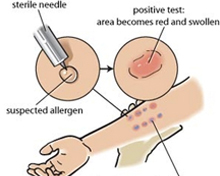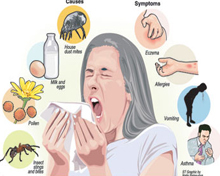Allergies

Everybody is aware of allergy as most of the people in some stage of life suffer from this disease. For common man, allergies are defined as abnormal reactions to ordinarily harmless substances.
The sensitizing substances, called allergens, may be inhaled, swallowed, or come into contact with the skin. Allergic reactions can occur in one area, such as sneezing or a skin rash or sneezing, or may include more than one symptom. When it hits on young children, it is matter of worry for mother because children do not express well the pain they are suffering from allergy. Infants get allergy mainly from food products. The most common items are milk, eggs, wheat, soy, fish and peanuts. After the age of three, children may suffer from the environmental allergies begin to have reactions to flowers, grasses and other airborne particles.
The fundamental cause of allergy is still not known. Allergy is caused by sensitive immune system, which leads to a misdirected immune reaction. The immune system of human body normally defends the body against injurious substances, such as bacteria and viruses. It reacts to substances called allergens that are generally harmless and in majority of cases, people do not cause a problem. But a person with allergies, the immune response is week. When it recognizes an allergen, it releases chemicals, such as histamines. Allergy may be due to family history. If any relative has allergy to some food, dust or anything then a person has more chances to be allergic with particular substance. Non-hereditary factors in fact play a vital role as well. There are many allergic diseases.
The most common allergic diseases are allergic rhinitis, non-allergic rhinitis, asthma, allergic dermatitis, contact dermatitis and urticaria. Allergic rhinitis is the most common of the allergic diseases and the main focus of health profile. Allergens that most frequently cause problems are: pollens, mold spores, house dust mites, foods, insect bites or stings, plants, insect spores, latex rubber, viruses, bacteria, medications and environmental conditions such as cold temperatures. Allergic reactions can also be caused by jewelry, cosmetics, and other substances. Well known symptoms of allergies are eczema, hives or other skin rashes, stomachache, headache, congestion, itchy eyes, runny nose, coughing and postnasal drip, sneezing, conjunctivitis and wheezing. Those kids who are very sensitive, their symptoms can begin as early as six months. If an infant is the victim then mother must have to watch carefully otherwise kids may get other troubled also.
 There are several methods of allergy testing. The most common
methods are the skin tests, elimination-type tests, and the
radioallergosorbent test (RAST). The scratch involves placement
of a small amount of suspected allergy-causing substances
(allergens) on the skin that is usually on the forearm, upper
arm, or the back and then scratching or pricking the skin so
that the allergen is introduced under the skin surface. The skin
is observed closely for signs of a reaction that are usually
swelling and redness of the site. Results are usually obtained
within about 20 minutes, and several suspected allergens can be
tested at the same time. A parallel method involves injection of
a small amount of allergen under the surface of the skin and
observing for a reaction at the site. Skin tests are most
helpful for respiratory allergies in which the allergen is
inhaled, a penicillin allergy, insect bite allergies, and food
testing. Food allergies are usually tested by using various
elimination diets. The suspected foods are not consumed for some
period (several weeks) and then slowly re-introduced one at a
time and the person is observed for signs of an allergic
reaction.
There are several methods of allergy testing. The most common
methods are the skin tests, elimination-type tests, and the
radioallergosorbent test (RAST). The scratch involves placement
of a small amount of suspected allergy-causing substances
(allergens) on the skin that is usually on the forearm, upper
arm, or the back and then scratching or pricking the skin so
that the allergen is introduced under the skin surface. The skin
is observed closely for signs of a reaction that are usually
swelling and redness of the site. Results are usually obtained
within about 20 minutes, and several suspected allergens can be
tested at the same time. A parallel method involves injection of
a small amount of allergen under the surface of the skin and
observing for a reaction at the site. Skin tests are most
helpful for respiratory allergies in which the allergen is
inhaled, a penicillin allergy, insect bite allergies, and food
testing. Food allergies are usually tested by using various
elimination diets. The suspected foods are not consumed for some
period (several weeks) and then slowly re-introduced one at a
time and the person is observed for signs of an allergic
reaction.
Because a person might believe he or she is allergic to a certain food, a double-blind test is sometimes recommended by medical practitioners to find out if this is true. In a double-blind test, suspected foods and placebos, harmless substances, are given in a disguised form. The person being tested and the provider are both unaware of whether the substance tested in that session is the placebo or the food substance. A third party knows about it and identifies them with some sort of code. Doctor recommends an ImmunoCap test for kids who are diagnosed as allergy with something. It is the most advanced allergy test. It's particularly helpful in infants and toddlers for whom skin prick testing on the back is not reliable. In this test, a small amount of blood is taken and sent to the lab where levels of IgE antibodies are measured for specific antigens (the agents that cause the allergy symptoms). This test may also be done to check immunotherapy or to observe if a child has outgrown an allergy, although it can only be used in a general way; the level of IgE present does not correlate to the severity of an allergic reaction and someone who has outgrown an allergy may have a positive IgE for many years later.
 Allergy is not life threatening disease. It can be cured
through lifestyle, good diet and medication. There are three
common methods of treatment of allergic diseases: avoidance of
the allergen, medication to relieve symptoms and allergy shots.
In avoidance method, wear a pollen mask when mowing the grass or
housecleaning, stay indoors in the morning when the pollen count
is at its highest and on windy days, read and understand food
labels. It is for people with food allergies. Person must keep
windows and doors closed during heavy pollination seasons. Use
the air conditioner in the house and car. Rid the home of indoor
plants and other sources of mildew. Don't allow dander-producing
animals in the house. Change feather pillows, woolen blankets
and clothing to cotton or synthetic materials. When avoidance or
control of an allergen does not work, medications may be taken
with doctor's advice. Common allergy medications are:
Decongestants: administered via spray or orally to unclog nasal
passages. Steroid nasal sprays: administered via spray to mute
the inflammatory response. When avoidance and environmental
control measures and medications become unsuccessful to control
allergy symptoms, the doctor may advise allergy immunotherapy.
Immunotherapy involves the injections of allergen extracts to
desensitize the person. Enclose mattress, box springs and
pillows in plastic barrier cloth. For treating allergy, it is
necessary to have deep knowledge and patient must visit to
doctor at right time. If there is delay in treatment, it can
have dangerous outcomes.
Allergy is not life threatening disease. It can be cured
through lifestyle, good diet and medication. There are three
common methods of treatment of allergic diseases: avoidance of
the allergen, medication to relieve symptoms and allergy shots.
In avoidance method, wear a pollen mask when mowing the grass or
housecleaning, stay indoors in the morning when the pollen count
is at its highest and on windy days, read and understand food
labels. It is for people with food allergies. Person must keep
windows and doors closed during heavy pollination seasons. Use
the air conditioner in the house and car. Rid the home of indoor
plants and other sources of mildew. Don't allow dander-producing
animals in the house. Change feather pillows, woolen blankets
and clothing to cotton or synthetic materials. When avoidance or
control of an allergen does not work, medications may be taken
with doctor's advice. Common allergy medications are:
Decongestants: administered via spray or orally to unclog nasal
passages. Steroid nasal sprays: administered via spray to mute
the inflammatory response. When avoidance and environmental
control measures and medications become unsuccessful to control
allergy symptoms, the doctor may advise allergy immunotherapy.
Immunotherapy involves the injections of allergen extracts to
desensitize the person. Enclose mattress, box springs and
pillows in plastic barrier cloth. For treating allergy, it is
necessary to have deep knowledge and patient must visit to
doctor at right time. If there is delay in treatment, it can
have dangerous outcomes.
Articles on Health
- Laparoscopic Surgery Advantages
- Laparoscopic Surgery History
- Laparoscopic surgery Procedures
- Limitations of traditional laparoscopic surgery
- New technologies for advance laparoscopic surgery
- Non-Robotic Laparoscopic Surgery
- Robotic Laparoscopic Surgery
- Causes and remedy for dark circles in females

- Harmful impact of mobile phone on unborn baby

- Maternal health care tips

- Rheumatoid Arthritis is Most Widespread in Female
- Periodontal ailment during Pregnancy
- Anemia is prevalent in Women
- Effect of Cell phone tower radiation on human health

- Current health scenario india
- Government health policies india
- Medical facilities india
- Hospital infrastructure india
- Shortage of Medical Professionals in India
- Quality standards indian hospitals
- Indian states health statistics
- Medical expenses india
- Hospitals in Ahmedabad
- Hospitals in Bangalore
- Hospitals in Chennai
- Hospitals in Cochin
- Hospitals in Delhi
- Hospitals in Hyderabad
- Hospitals in Kolkata
- Hospitals in Mumbai
- Hospitals in Pune
- Hospitals in Coimbatore
- Hospitals in Kochi
- Orthopaedics Hospitals in India
- Diabetology Hospitals in India
- Cardiology Hospitals in India
- Infertility Hospitals in India
- Neurology Hospitals in India
- Paediatrics Hospitals in India
- Nephrology Hospitals in India
- Oncology Hospitals in India
- Antiaging foods to improve skin

- Tips for Maintaining healthy bones
- Guidelines for preventing heart disease
- Tips to reduce eye strain while working on computer
- Mental health problems among elderly people
- Health problem of piles

- Health advices for air travel

- Dealing with Allergies
- Tips for Eyes Care
- Care for Crystal Clear Skin
- Tips For Healthy Hair
- Healthy Living is The Absolute Measure of Happiness
- Let Fragrance Rule Your Summer
- Most common vestibular disorder

- Osteoporosis Risk Factors
- Dengue

- Endocrine disorder

- Causes of liver damage
- Dry eye syndrome
- Kidney Stones
- Conjunctivitis: Irritating eye disease
- Anxiety Disorder
- Causes of Brain Damage
- Hepititis B
- Knowledge of Osteoarthritis
- Mental Illness
- Back Pain
- Sugar Addiction
- Diet Control Plans
- General Motors Diet Plan
- No Carbohydrate Diet
- One day Diet Plans
- Seven day diet Plans
- Vegetarian Diet
- Food for Health
- Genetically Modified Foods
- Healing Effects Of Fruits
- Vegetables That Heal
- Healing Effects Of Spices and Herbs
- Test your Stress Level
- Mantras for Relaxation & Stress free life
- Take walk For a healthy body and mind
- Squint is frequently observed in Children
- Consult-Doctor
- Free Handy Health Advice